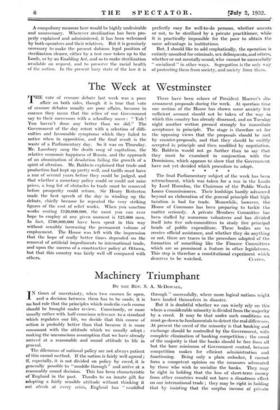The Week at Westminster
THE vote of censure debate last week was a poor affair on both sides, though it is true that vote of censure debates usually are poor affairs, because in essence they mean that the relics of one Government say to their successors with a schoolboy sneer : " Yah ! You haven't done any better than we did." The Government of the day retort with a selection of diffi- culties and favourable symptoms which they failed to notice when in opposition, and the final result is the waste of a Parliamentary day. So it was on Thursday. Mr. Lansbury sang the death song of capitalism, the relative economic happiness of Russia, and the approach of an abomination of desolation failing the growth of a spirit of altruism. Mr. Baldwin explained that trade and production had kept up pretty well, and tariffs must have a run of several years before they could be judged, and that whether a monetary policy could or could not raise prices, a long list of obstacles to trade must be removed before prosperity could return. Sir Henry Betterton made the best speech of the day in winding up the debate, chiefly because he repeated the very striking figures of the cost of relief works. When you sanction works costing £120,000,000, the most you can ever hope to employ at any given moment is 125,000 men. In fact, 1700,000,000 have been spent in this way without sensibly increasing the permanent volume of employment. The House was left with the impression that the hope of really better times depended on the removal of artificial impediments to international trade, and upon the success of a constructive policy at Ottawa, but that this country was fairly well off compared with others. There have been echoes of President Hoover's dis- armament proposals during the week. At question time one section of the House has shown some anxiety lest sufficient account should not be taken of the way in which this country has already disarmed, and on Tuesday night another section pressed strongly for immediate acceptance in principle. The stage is therefore set for the opposing views that the proposals should be met by counter-proposals, and that they should be swiftly accepted in principle and then modified by negotiation. Mr. Baldwin would not go further than to say that they must be examined in conjunction with the Dominions, which appears to show that the Government have not yet decided which procedure to adopt.
The final Parliamentary subject of the week has been retrenchment, which was taken for a run in the Lords by Lord Hunsdon, the Chairman of the Public Works Loans Commissioners. Their lordships hardly advanced beyond an elaboration of the general principle that high taxation is bad for trade. Meanwhile, however, the House of Commons has been preparing to tackle the matter seriously. A private Members Committee has been staffed by numerous volunteers and has divided itself into five sub-committees to study five principal heads of public expenditure. These bodies are to receive official assistance, and whether they do anything or not, there are traces in the procedure adopted of the formation of something like the Finance Committees which are so prominent a feature in other legislatures. This step is therefore a constitutional experiment which






































 Previous page
Previous page